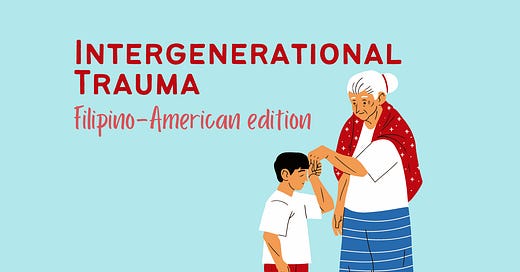Intergenerational trauma in Filipino-American families
A conversation on what intergenerational trauma is from the perspective of Filipinos in the diaspora.
Intergenerational trauma is defined as trauma passed down onto families and is a recently buzzing topic in discussion amongst immigrant families - especially Asian-Americans and Pacific Islanders (AAPI). Films released the past few years like "Turning Red” and “Everything Everywhere All at Once” uplifted the conversations around intergenerational trauma, the immigrant experience, and the “model minority” myth from a mother-daughter perspective in East Asian cultures. In this week’s newsletter, we’re exploring what intergenerational trauma is and its impact on community from a Filipino-American perspective.
Most minority groups fall under the immigrant experience, facing challenges that affect our identities such as assimilation, racism, the effects of colonialism, and alienation. And the outcomes of such experiences are the results of intergenerational trauma. Although experiences amongst the minority groups are similar, each group has their own unique experiences that are different because of a number of factors such as economics, immigration, class, family, etc.
I wanted to learn more about the Filipino diasporic experience in the context of intergenerational trauma, so I spoke with two Filipinos to discuss their journeys and how they navigate. I reached out to Nadine, a fellow classmate who I graduated alongside with and is now working towards a masters in social work in Jane Addams College of Social Work at the University of Illinois, to get insights and experiences.

“We carry the burdens that our families have experienced throughout generations - from our ancestors to our great-grandparents to our parents,” she answered after I asked her for her definition of intergenerational trauma. “Even if we’re not directly experiencing that in our current lives, oftentimes, in first world countries, we are still experiencing a lot of psychological distress that comes with interacting with family members who have not yet processed that trauma. And so we sometimes become the unintentional target for that unprocessed trauma.”
These relationships with our families are delicate and nuanced, and it takes time and lots of talking to navigate these gray areas with our families. “I often have to have tough conversations with [my family],” Nadine explained. “You have to be a little unafraid to point out that, in the end, we are all non-white people. And, to many white people, that makes us all the same.”
I also spoke with Clifford Temprosa, who works at the Pilipino American Unity for Progress (abbreviated as UniPro) and Coalition for Asian American Children and Families and works in local politics, who spoke from a hyper-community perspective and its impacts on the Filipino community. “It really goes back to the hierarchy of needs,” Clifford said. “Our parents wants us to be secure and have a sustainable life. Meanwhile, the more established generation wants to be happy and fulfilled. We need to start teaching this to, I think, other Filipino Americans, especially when they’re younger and to not put them on a pedestal to say that the very vision of success is a doctor or nurse.”
This vision of success, which according to Filipino immigrants is defined as working towards becoming a nurse, comes from a capitalist idea: labor export policy in the Philippines. If you’re not familiar with the “labor export policy”, it’s when the economic vitality of the Philippines rely heavily on the migration of Filipinos. As a result of this, many Filipinos who work abroad work as (none other than) nurses due to the nursing shortage in many countries and the Philippine’s labor diaspora is one of the biggest in the world where around 10 percent (9 million people) of the population live overseas. It’s an export policy that people like my parents and parents of Filipino expats in the global diaspora have become a part of.
“It goes back into a fundamental root of what constitutes as the Philippines,” Clifford said. “Why are we saying that a vision of success is going to leave your country? It’s not an issue that only policy can tackle […]: it’s intersectional.”
This goes beyond the Philippines, as many immigrants move to the West - typically to the States and for the reason of “better opportunities”. It perpetuates the monolithic “immigrant experience” in which the countries we came from - whether that’s the Philippines, India, Mexico, Pakistan, China and so forth - don’t have the “perfect life” we all crave which is the life perpetuated by the idealistic white-picket-fence-and-green-lawn-suburban-houses that is the “American Dream”: the capitalist concept used on immigrants to create a system that exploits them and creates no upward mobility. And with this comes the isolation, the shame of our identities, and assimilation.
“Unifying ourselves as people of color experiencing a lot of similar things is going to get us a lot farther than branching off into our specific communities and hating each other because of the fact that white people have elevated some groups more than others.” Nadine told me in talking about the immigrant experience. “There’s no reason for us to fully separate ourselves from an experience of a Mexican or Black person when a lot of us are experiencing the same things at the hands of the same system we’re all trying to fight.”
Similarly, Clifford talks about solidarity and strengthening our community as Asian Americans: “Why are we not showing up for the other Asian American communities in New York who understand this is the same situation that we're going through, who understand what it means to be oppressed, to be marginalized, to be overshadowed, to be underrepresented? The idea is, folks come to New York, into America, to have better opportunities, but history has shown us whatever that happened, and they came to America, there has been levels of racism and oppression that go on because of fear, of insecurity, because of a lack of collective organization.”
The conversation on intergenerational trauma is like a spiderweb consisting of intricate patterns and links; it’s nuanced and complex that there are so many avenues you can branch off of, going deeper into a conversation that helps us learn more about who we are, our past, and how we can strengthen our communities. In discussing their ending notes with Nadine and Clifford, they said the same thing: to continue these kinds of conversations. To continue challenging ourselves, our values and ideas, and our perspective on the world. Not only that, but to build up the present communities we have around us.
“It’s about understanding that, at the end of the day, we're trying to center people. So I can talk about a lot of what I think needs to happen as a collective, we're in a community, but I was not raised in the Philippines and everyone has a different understanding and a different level of support.” said Clifford.
“Here, we have the opportunity to understand the political landscape. Yes, we have to do our due diligence and support back home. But again, I will always be here to challenge that thought and say: What are you doing in America in New York, to progress? What is Filipino American? Are Filipino Americans just people who can sing and can dance who can cook?”
“Can we find ways that we can be inspirational to Black and Brown communities, to South Asian communities, to Latino communities? Because at the end of the day, we're only holding a title for the next generation. If we can't set up an environment where the next generation can do better than us, then we failed as a prior generation.”
Submit to bayanihan and share your stories!
Personal essays, immigrant experiences, or anything about your identity you want to share, I want to share in my new series bayanihan.
More info here.





